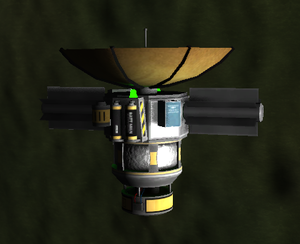Difference between revisions of "Probe"
m (*there is no need to save space there;) |
(+Usage section; expanded some prior content.) |
||
| Line 4: | Line 4: | ||
'''Probes''' are [[craft]] whose [[command module]]s have zero crew capacity, modules generally known as “probe cores”. Craft controlled by probe cores that include crewed modules lacking command capability (the [[PPD-10 Hitchhiker Storage Container]] or the [[Mobile Processing Lab MPL-LG-2]]) are automatically typed by KSP as probes, although players may consider them some other [[Craft#Vessel types|type]] of craft. Likewise, players may consider particularly large probes or probes resembling conventional [[plane]]s, [[rocket]]s, or [[rover]]s as belonging to other types or categories. | '''Probes''' are [[craft]] whose [[command module]]s have zero crew capacity, modules generally known as “probe cores”. Craft controlled by probe cores that include crewed modules lacking command capability (the [[PPD-10 Hitchhiker Storage Container]] or the [[Mobile Processing Lab MPL-LG-2]]) are automatically typed by KSP as probes, although players may consider them some other [[Craft#Vessel types|type]] of craft. Likewise, players may consider particularly large probes or probes resembling conventional [[plane]]s, [[rocket]]s, or [[rover]]s as belonging to other types or categories. | ||
| − | + | == Usage == | |
| + | Probes can be used for any type of craft and thus for any purpose. However, crewed command modules include [[Science]] opportunities for [[Science#Crew Report|Crew Reports]], [[Science#EVA Report|EVA Reports]], and, while landed, [[Science#Surface Sample|Surface Samples]]. [[Kerbonaut]]s can also repair landing legs, wheels, and repack any parachutes, while probes cannot. | ||
| − | Even though probe cores constantly consume [[electricity]] and thus usually need more batteries and energy-sources than manned command pods, the mass of a probe is much lower than that of a manned vessel with comparable abilities in most cases. A lower payload mass means that less fuel is required to bring it to its destination. Also, some players have ethical issues with abandoning Kerbals while they do not worry about abandoning an unmanned probe. Not requiring the fuel for the return trip further increases the range of the vessel. | + | Even though probe cores constantly consume [[electricity]] and thus usually need more batteries and energy-sources than manned command pods, the mass of a probe is much lower than that of a manned vessel with comparable abilities in most cases. A lower payload mass means that less fuel is required to bring it to its destination, which also means destinations further away are far more feasible for probes than manned vehicles. Critically, lowering payload mass means exponentially less initial mass on launch within the atmosphere. |
| + | |||
| + | Also, some players have ethical issues with abandoning Kerbals while they do not worry about abandoning an unmanned probe. Not requiring the fuel for the return trip further increases the range of the vessel. | ||
[[Category:Craft]] | [[Category:Craft]] | ||
Revision as of 23:01, 11 August 2014

Probes are craft whose command modules have zero crew capacity, modules generally known as “probe cores”. Craft controlled by probe cores that include crewed modules lacking command capability (the PPD-10 Hitchhiker Storage Container or the Mobile Processing Lab MPL-LG-2) are automatically typed by KSP as probes, although players may consider them some other type of craft. Likewise, players may consider particularly large probes or probes resembling conventional planes, rockets, or rovers as belonging to other types or categories.
Usage
Probes can be used for any type of craft and thus for any purpose. However, crewed command modules include Science opportunities for Crew Reports, EVA Reports, and, while landed, Surface Samples. Kerbonauts can also repair landing legs, wheels, and repack any parachutes, while probes cannot.
Even though probe cores constantly consume electricity and thus usually need more batteries and energy-sources than manned command pods, the mass of a probe is much lower than that of a manned vessel with comparable abilities in most cases. A lower payload mass means that less fuel is required to bring it to its destination, which also means destinations further away are far more feasible for probes than manned vehicles. Critically, lowering payload mass means exponentially less initial mass on launch within the atmosphere.
Also, some players have ethical issues with abandoning Kerbals while they do not worry about abandoning an unmanned probe. Not requiring the fuel for the return trip further increases the range of the vessel.